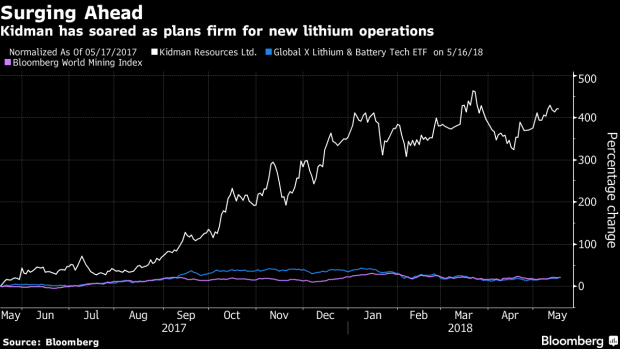May 17, 2018
Tesla strikes lithium deal from Australia plant that's even built yet
, Bloomberg News

Tesla Inc. (TSLA.O) struck a lithium hydroxide supply deal with a junior Australian miner that won’t start production until next decade, underlining the scramble for the raw materials needed to meet forecast demand for electric vehicles.
Kidman Resources Ltd. will supply Tesla from a planned refinery in Western Australia for an initial term of three years, the Melbourne-based company said Thursday, without disclosing financial terms. The fixed-price agreement also contains options for a couple of three-year extensions.
It’ll be 2021 before Kidman begins producing the much sought-after lithium hydroxide under a joint venture with Chile’s giant Sociedad Quimica y Minera de Chile SA. A mine to feed the plant at Mt. Holland -- the world’s third-largest hard rock lithium deposit -- won’t be built until next year, according to a presentation this month.
“The fact that this is a deal for product that won’t be available for three years shows the urgency in the sector,” Reg Spencer, a Sydney-based analyst at Canaccord Genuity Group Inc., said by phone. “What we are seeing is that automakers are increasingly willing to go all the way upstream, even to the individual mine, to secure supply.”

Car and battery manufacturers, including Elon Musk’s Tesla, are on a global hunt for sources of lithium, cobalt and other raw materials, with BMW AG forecasting in December that its requirement for the key metals will surge 10-fold by the middle of the next decade. Production of lithium alone probably needs to quadruple within a decade to meet demand for EVs, Goldman Sachs Group Inc. said last year.
Tesla plans to announce the location of a new gigafactory in China as early as in the third quarter as it seeks to produce batteries and cars in the world’s biggest electric vehicle market. The company declined to comment on its deal with Kidman.
Kidman closed 2.8 per cent higher in Sydney on Thursday. The developer’s shares have surged more than 400 per cent in the past year. Lithium producer Galaxy Resources Ltd. rose 8.4 per cent, as Orocobre Ltd. jumped 7.1 per cent.
“The Tesla agreement is an important milestone for Kidman,” Managing Director Martin Donohue said in an e-mailed statement. Kidman will “continue to explore the potential for further offtake arrangements with other strategic, globally significant parties,” he said.
Kidman is seeking to agree about three supply deals and has held talks with battery manufacturers, car makers and trading houses, Chief Financial Officer Charles McGill said last week in an interview. The company aims to also retain some material for sales in the spot market.
“The Tesla deal will put a rocket under the others to agree the supply deals,” Canaccord’s Spencer said. “It’ll also help Kidman as it looks to secure financing for the refinery.”
Chile’s SQM and Kidman are targeting annual capacity of 44,000 metric tons of lithium hydroxide from their joint refinery in Western Australia. Kidman’s deal with Tesla equates to less than a quarter of the company’s initial share of production, according to its statement.
Lithium hydroxide -- as opposed to alternative lithium products -- is increasingly becoming favored by major battery producers and car makers, including Tesla, as it’s able to provide better range between re-charging, China’s Tianqi Lithium Corp. said in March.





